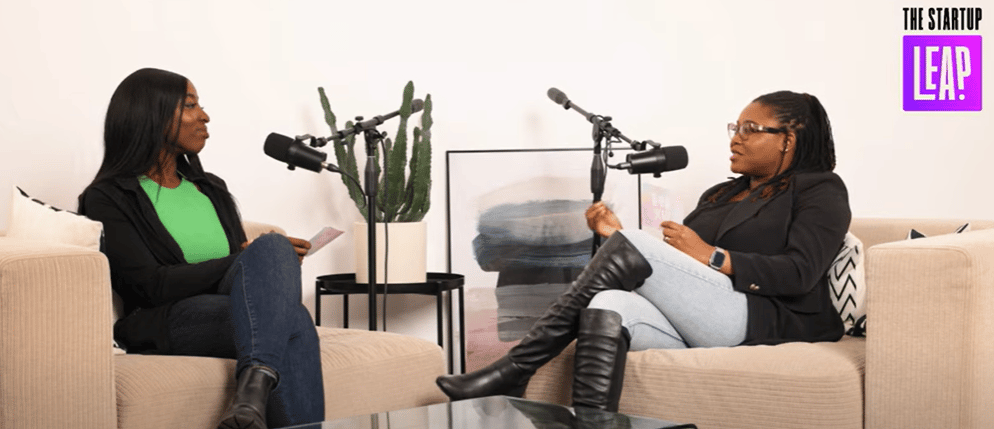Dive into the full conversation on YouTube, Spotify or Apple Podcasts!
Welcome back to The Startup Leap Newsletter #18 - #RealTalk #RealLessons From Founders Who Took The Startup Leap 🚀
💡 This week, we’re tackling a big founder dilemma: should you raise venture capital - or build another way?
Spoiler: there’s no one-size-fits-all answer.
From Shagun Utamchandani scaling to a $1.25B exit with minimal funding, to Tope Awotona bootstrapping Calendly before raising $350M, to Timmy Armoo choosing angels over VCs - this episode breaks down what investors really look for, how dilution plays out over time, and why revenue might just be your best funding source.
Because raising capital isn’t just about the money - it’s about the kind of company you want to build.
In this episode, we break down:
What venture capital really is - and how it works behind the scenes (00:02:39),
What VCs are actually looking for (think: 100x outcomes, massive markets, and tech-enabled growth) (00:03:40),
The real trade-offs of taking VC - like dilution, control, and pressure to scale fast (00:05:43),
Alternative funding paths founders overlook - from revenue and crowdfunding to grants and family offices (00:10:25),
….and so much more!

Key takeaways:
TL;DR:
VC = Equity + Pressure: It’s not just money - you’ll give up control and need to chase billion-dollar outcomes.
Not All Startups Fit VC: If your market isn’t huge or tech-enabled, other paths may suit you better.
Revenue Is Power: Customer cash is non-dilutive and proves people want what you’re building.
More Than One Way to Fund: Angels, crowdfunding, grants - founders like Sabrina (KORE Labs) and Louise (Go Henry) made them work.
💸 VC Funding Isn’t Just Money - It’s a High-Stakes Partnership (00:02:39)
Maria and Yvonne start by breaking down what venture capital actually is: not just free cash, but an early-stage partnership where you trade equity for scale.
Here’s what that means in practice:
VCs are looking for big returns: If a VC invests $1M, they’re expecting a $100M return.
That often means you're expected to build a billion-dollar company.
You give up equity and control: Each round of VC funding dilutes your ownership - and adds external voices to the table.
Founders like Melanie Perkins (Canva) and Katrina Lake (Stitch Fix) own just 10–16% at scale.
There are long-term implications: VCs join your cap table for the journey.
That includes board control and, if things go sideways, potentially replacing you as CEO (Steve Jobs, Travis Kalanick… it happens).
If you're chasing hypergrowth and okay with giving up equity and control in exchange for scale, VC can be a rocketship.
But know what you're signing up for - these are your co-owners, not just funders.📊 Not Every Startup Is Venture-Backable - And That’s OK (00:03:40)
Yvonne poses the key question every founder should ask before raising: what problem are you solving with capital? And does it truly require VC fuel?
Here’s what to consider:Market size & margins matter: VCs back companies that can scale fast in large markets.
A common benchmark? Getting to £1M in revenue in 12–18 months and aiming for £100M+ in five years.Tech-enabled? You’re in: Tech startups tend to scale faster and more efficiently, which is why B2B SaaS models are often VC darlings.
Trajectory is everything. Shopify started as a snowboarding shop. Twilio began as a consultancy. The magic? They spotted a bigger opportunity in their own tools.
Be honest - does your business have the scale and margin profile to meet VC expectations?
If not, you can still build a profitable, successful company, just by other means.
🛠️ Revenue Might Be the Most Underrated Funding Source (00:10:25)
“One of the most incredible capital sources is revenue.”
Why?
It’s non-dilutive: You don’t give up equity for customer cash.
That means more ownership and control.
It validates product-market fit: If customers are paying, you're solving a real problem - and you may not need outside capital to keep growing.
It opens new doors: Carmel Cadet (EmTech) landed a $500K pilot deal.
That’s the size of many pre-seed rounds today - and it gave her leverage going forward.🌱 There Are More Funding Paths Than You Think (00:12:18)
VCs aren’t your only option - and for many founders, they’re not the best one either.
Angel investors & family offices are often more patient. They may accept smaller exits and align with your long-term vision.
Crowdfunding worked for Louise Hill at GoHenry - allowing her to raise from a community who believed in her product.
Grants and employer networks played a huge role for Sabrina (Kore Labs), who tapped into past colleagues and early-stage grants to get off the ground.
Want to hear more? Dive into the full conversation on YouTube, Spotify or Apple Podcasts!
🎥 Get a Glimpse of the Action Below…
@thestartupleappod MOST Overlooked Funding SOURCE💡 Subscribe to our newsletter to join the community: subscribe.thestartupleap.io #Entrepreneurship #business... See more
🚀 What resonated most with you? Share your biggest takeaways from this episode with us on YouTube.
Let’s keep the conversation going!
Resources to help you take the Leap📚
Thanks for reading 💜
Let us know what you loved, what you’d like more of, or any questions you’d love us to explore in future episodes!
Catch up on previous newsletters here, and if you think someone else would enjoy it, they can sign up here.
You can read more about TSL on our website and follow us on our YouTube, LinkedIn, Instagram, X and TikTok channels so you never miss an update!
Want to sponsor this newsletter, have any burning questions for experienced founders or suggestions? 📰 → drop us an email!
TSL Team 💜

